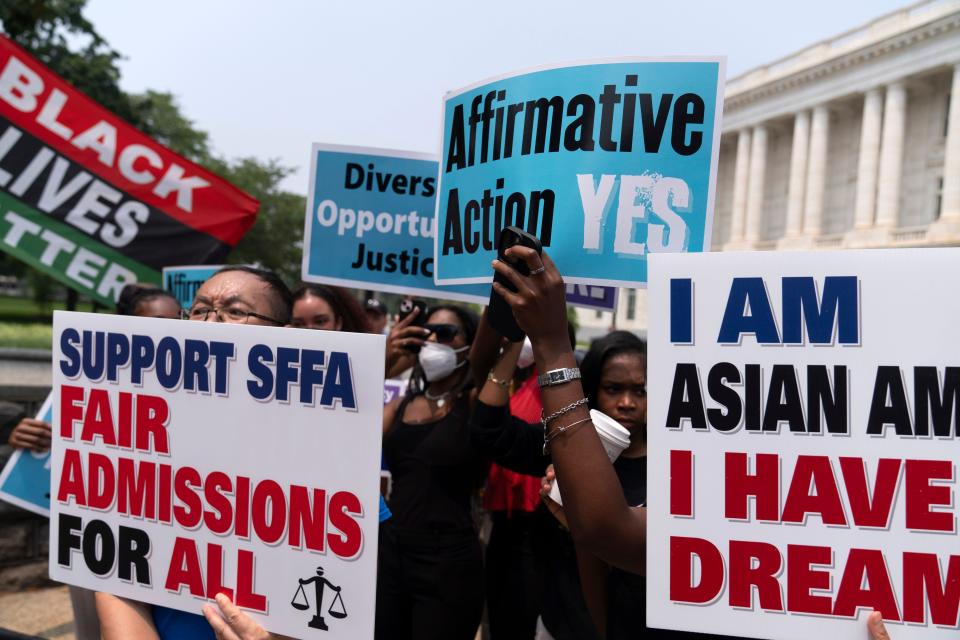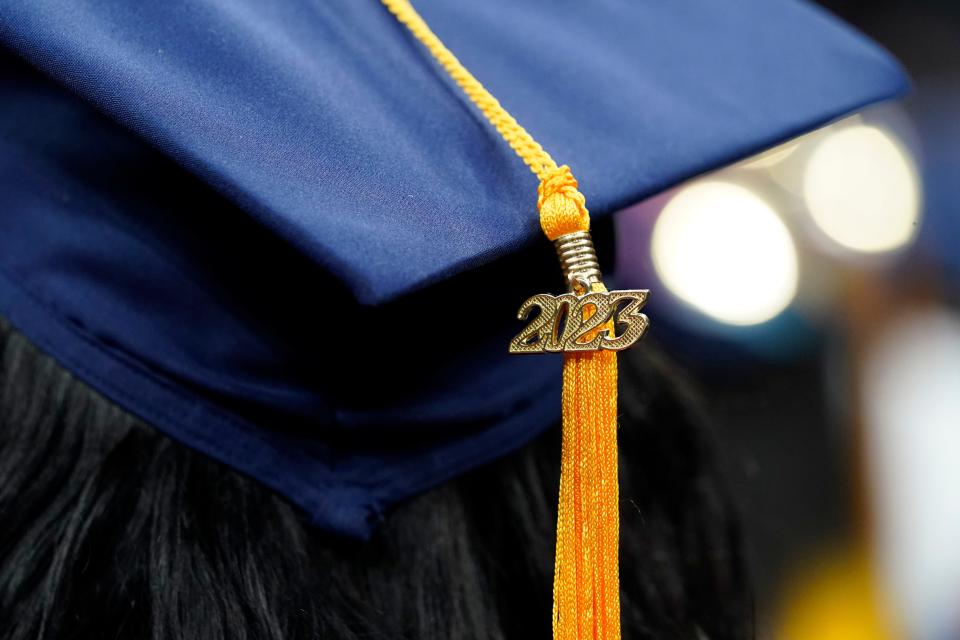After Supreme Court affirmative action ruling, renewed focus on first-generation students
As the daughter of a single mother who started college but wasn’t able to finish her degree, Natalie Lebron-Marines was unsure whether to check yes or no when answering the question about first-generation status on her college applications.
“In the application process, one of the first questions you’re asked is, ‘Are you first-generation?’ And it’s like, 'OK, well what does that mean?'” Lebron-Marines said.
Now a rising senior at North Central College, a private college in Naperville, Illinois, Lebron-Marines said she could not imagine her college experience without the first-generation programming and support she was offered on her campus, where about 38% of students are considered first-generation college students.
“When I entered North Central, you literally have an immediate network of people and you all share one thing in common: that you are first-gen. And that program helped me find my best friends who I still talk to to this day,” Lebron-Marines said. “It's very reassuring to know that there are programs like this that exist.”
Colleges may come to rely more heavily on indicators such as applicants' first-generation status to boost their diversity after the Supreme Court ruling last month that bans considering race as a factor in admissions. How schools define first-generation, however, varies.
Blow to diversity efforts: Supreme Court blocks use of affirmative action at Harvard, UNC
First-generation students – typically those whose parents did not attend or graduate from college – made up about 56% of the undergraduate population in the United States in 2015, according to data sourced by the National Association of Student Personnel Administrators (NASPA). But the numbers vary widely among states and institutions. A 2018 study found that 22% to 77% of students would qualify as first-generation depending on which of some eight definitions analyzed were used.
Across the country, the first-generation label is used by colleges to measure mobility and access and to indicate students who might need additional support navigating higher education. NASPA's data found these students tend to be students of color, with 59% of Black graduates and 60% of Hispanic graduates in 2016 identifying as first-generation. Many first-generation students also identify as low-income, and their median family income is about $41,000 a year, according to NASPA.

These students struggle in particular with the “hidden curriculum” of college, which includes “navigating the tangled web of college policies, procedures, jargon and expectations,” according to the Center for First Generation Student Success.
Is first-generation the future of diverse college admissions?
After a Supreme Court ruling in late June banning race-conscious admissions policies, universities are increasingly expected to turn to indicators like first-generation status and adversity scores to boost diversity on their campuses.
Although colleges have asked students about their first-generation status during the application process for years, experts do expect that first-generation students will be increasingly sought-after by university admissions and recruitment offices after the ruling because it is considered a race-neutral category.
But Sarah Whitley, vice president for the Center for First-Generation Student Success, cautions against universities solely relying on first-generation status as a proxy for race to maintain diversity. Whitley stressed it would be harmful to assume all first-generation students are students of color. According to NASPA, about 46% of first-generation students are white.
'Barriers are going back up for us:' Students say SCOTUS rulings on student debt, affirmative action deter them from college
David Grusky, a professor of sociology at Stanford University in Northern California, said first-generation and low-income status is meant to address mobility and economic access that can target wealth and income inequality. Therefore, first-generation status is not equipped to fully address the racism that “is so fundamental to society.”
“It will be a targeted group, but first-gen is not a proxy or replacement for race-based admissions,” said Abraham Anthony Jack, associate professor and faculty director of the Newbury Center for first-generation students at Boston University. “The racial history of America did not discriminate against, did not sequester and segregate, first-generation students. They targeted Black and brown communities.”
David Garza, executive director of LEDA, a nonprofit that helps under-resourced students reach highly selective colleges, said working to recruit first-generation and under-resourced students can still benefit universities hoping to maintain racial diversity.
LEDA selects a cohort of 100 high school juniors each year to participate in a five-week summer program at Princeton University and receive college application support throughout their admissions process. Although LEDA does not consider race while selecting its cohort, Garza noted 91% of their scholars are students of color and 73% of them are first generation.
“We’re obviously able to recruit and put together a class that is incredibly diverse without using race as a factor,” Garza said. “I think that LEDA’s work is more urgent than ever and that we can probably be helpful in helping universities identify the kinds of students that they want to keep attracting.”
To further support first-generation students, experts encourage the creation of nationalized data that can help improve tracking and identification of first-generation students across the country to better support their needs.
“Current research tells us that first-generation students are less likely to persist, and it is not their problem. It is our problem,” said Daphne Rankins, associate vice president for special programs at Virginia Commonwealth University. “If we are going to accept them, it is our duty to make sure that we have resources in place to level that playing field."

Who is a first-generation student?
First-generation students often lack the cultural capital needed to understand the unsaid and unwritten rules and expectations of higher education, Jack said.
“What happens when we admit a diverse class and you forget to tell the new people the big old rules. What happens when you don't make explicit all the winks and the nods?” Jack said. “There are some students who are so used to campus that they will never ever use a map a day in their life. And there are some students who will live by that map because nothing is familiar.”

At North Central College, a student is considered first-generation if neither parent completed a four-year degree, which matches the federally recognized definition. This information is self-reported by students during the application process, said Julie Carballo, assistant dean of first-generation, transfer and veteran initiatives at the school.
Although that definition is popular among many schools, some institutions opt for a more expansive one, including students whose parents or guardians did not obtain a four-year degree in the United States, Whitley said.
Jack, who has studied the experience of disadvantaged students at elite schools, also said students at highly selective institutions sometimes embrace the term “first-generation Ivy,” which means their parent or guardian did not attend an elite university.
“First-generation is both an identity and a category,” Jack said. “The reason why it is such murky territory is because there is no universal definition or outside body to verify if you are first-gen.”
According to Whitley, the Center for First Generation Student Success, which is housed under NASPA, chooses not to put forth a rigid definition of first-generation because “it really needs to be about what an institution needs to be successful.”
“So schools in California have very strongly moved toward the expanded definition while, you know, a school in small-town Wyoming might not be as focused on that because that really doesn't serve their population appropriately,” Whitley said.

How are first-generation students supported?
While many programs like LEDA aim to support disadvantaged students before and during their college application process, the Center for First Generation Student Success works directly with universities to develop programming and improve their ability to support first-generation students’ needs once they arrive on campus.
“We fundamentally believe that it's not the onus of first-generation students to figure out everything about college. It's really the responsibility of colleges and universities to do better for first-generation students to support their ability to be successful,” Whitley said.
With guidance and support from the center, Boston University launched the Newbury Center in 2021 with the goal of fostering support for first-generation students. Unlike many similar programs, the Newbury center is for both undergraduate and graduate first-generation students.
First-generation graduate students at Boston University are considered students whose parents did not complete an advanced degree, which includes master's, Ph.D. and other professional degrees.
As the inaugural director of the center, Maria Dykema felt it was important to support the graduate student community, which is “oftentimes not thought of or forgotten on their campus.” The center offers academic and financial aid support as well as internship and study-abroad opportunities. They also manage cohort and mentoring programs as well as family outreach.
At North Central College, first-generation support is provided through their Cardinal First program, which is designed to last all four years of a student's undergraduate career. They also offer a $1,000 renewable scholarship after a student’s first year of participation in the program.
“We don't ask students to go find a community. We provide a community which is so important to students' sense of belonging,” Carballo said. “We have created a culture here on this campus where first-generation identity is celebrated and recognized among our students.”
This article originally appeared on USA TODAY: Affirmative action ruling puts focus on first-generation students

